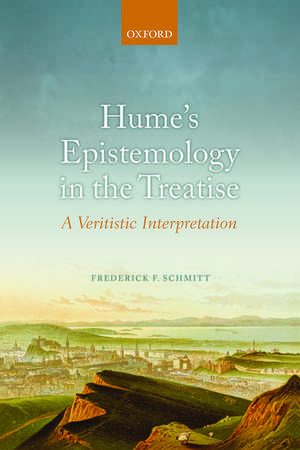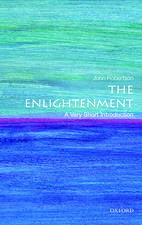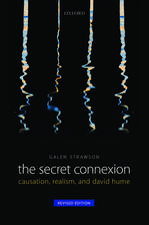Hume's Epistemology in the Treatise: A Veritistic Interpretation
Autor Frederick F. Schmitten Limba Engleză Hardback – 30 ian 2014
Preț: 504.32 lei
Preț vechi: 946.45 lei
-47% Nou
Puncte Express: 756
Preț estimativ în valută:
96.51€ • 100.39$ • 79.68£
96.51€ • 100.39$ • 79.68£
Carte tipărită la comandă
Livrare economică 03-09 aprilie
Preluare comenzi: 021 569.72.76
Specificații
ISBN-13: 9780199683116
ISBN-10: 0199683115
Pagini: 444
Dimensiuni: 163 x 237 x 32 mm
Greutate: 0.81 kg
Editura: OUP OXFORD
Colecția OUP Oxford
Locul publicării:Oxford, United Kingdom
ISBN-10: 0199683115
Pagini: 444
Dimensiuni: 163 x 237 x 32 mm
Greutate: 0.81 kg
Editura: OUP OXFORD
Colecția OUP Oxford
Locul publicării:Oxford, United Kingdom
Recenzii
Frederick F. Schmitt's Hume's Epistemology in the Treatise: A Veritistic Interpretation is a formidable work. It offers a careful, rich, and detailed interpretation of Hume's epistemology, which Schmitt then uses to illuminate some of the more perplexing aspects of Hume's masterpiece... Schmitt's research is impeccable and strikes an excellent balance between philosophical interpretation and historical contextualization... the familiar reviewer's refrain that it is impossible to do justice to the work under review was never truer than in this case.
Hume's Epistemology in the Treatise is an important work. It provides very close readings of portions of Treatise 1.3 and 1.4. It presents a strong case for a reliability reading of Hume's epistemology.
Schmitt's book is very thoughtful and rich with insight.
Hume's Epistemology in the Treatise is an important work. It provides very close readings of portions of Treatise 1.3 and 1.4. It presents a strong case for a reliability reading of Hume's epistemology.
Schmitt's book is very thoughtful and rich with insight.
Notă biografică
Frederick F. Schmitt is Professor of Philosophy at Indiana University. He specialises in epistemology, metaphysics, and the history of those subjects, especially British empiricism. He has worked on reliability and naturalistic epistemology, as well as internalism and externalism about justified belief; social epistemology, especially testimony and group justification (editing a volume on the subject, Socializing Epistemology, Rowman & Littlefield, 1994); and the metaphysics of collectivities (editing Socializing Metaphysics, Rowman & Littlefield, 2003). He is the author of an introductory book, Truth: A Primer (Westview Press, 1995), and editor of Theories of Truth (Blackwell, 2004). He has written articles on the epistemology of Descartes and Peirce. Recently, he has examined the epistemology of cognitive capacities and dispositions (specifically, intelligence and and curiosity) and the philosophy of David Hume. He is an associate editor of Episteme.













